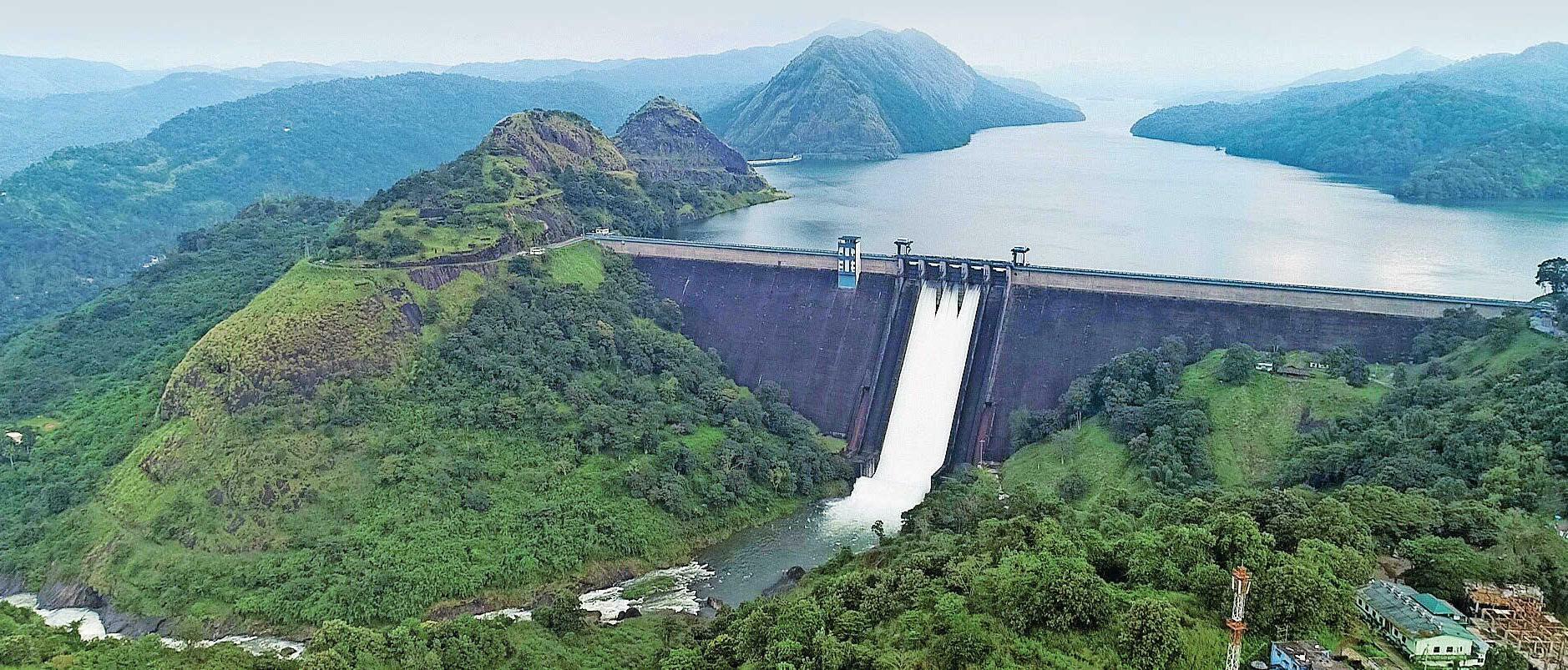Prøve GULL - Gratis
RESERVOIR OF WORRIES
THE WEEK India
|September 22, 2024
India has a robust dam management systém on paper, but inadequate maintenance and climate change pose serious threats

Mindo, 52, points to her rebuilt verandah, a stark reminder of the floods that damaged her house in Sultanpur Lodhi’s Mandala village last year. As she offers a charpoy and a cup of tea—the warm Punjabi welcome— she recalls how water engulfed her house, even breaching the metre-high porch. “It was a nightmare,” she says. Her son Haroon, who runs a grocery shop to supplement the income from farming, nods in agreement. “We had to borrow money to rebuild, with no help from the government,” he says. Nearby, labourer Santosh Singh, 28, is still repaying the hefty loan he took to reconstruct portions of his flooded home.
The situation is no different in Talwara, about 90km from Sultanpur Lodhi. Says Jigir Singh, a rice farmer from Tadhe Pind: “My farms, spread over 12 acres, were submerged, and the crops completely destroyed.” The 55-year-old remembers seeing such floods more than 40 years ago, indicating changes in the monsoon pattern. Thousands of villages in more than 24 districts in Punjab bore the brunt of the fury of the Sutlej and the Beas; nearly 50 people died.
While in the north, the Bhakra Nangal and the Pong dams overflowed to wreak havoc downstream, the sudden gush of water from Kerala’s Idukki dam in 2018 also pointed to, as the local people put it, a major shift in rainfall. C.J. Stephen, 48, representative of the merchants’ association in Chappath on the banks of the Periyar, says that normally, even if water was released from the Idukki Dam, it would take three hours to reach Chappath. “But that day, the Idukki collector instructed us to immediately relocate products kept in our shops,” he recalls. “We informed the shop owners, but not many took the warning seriously. By evening, water from both the rains and the dam release flooded the village. Many merchants had stocked up in advance for the Onam season. They lost everything.”
Denne historien er fra September 22, 2024-utgaven av THE WEEK India.
Abonner på Magzter GOLD for å få tilgang til tusenvis av kuraterte premiumhistorier og over 9000 magasiner og aviser.
Allerede abonnent? Logg på
FLERE HISTORIER FRA THE WEEK India

THE WEEK India
WHERE THE STORM NEVER REALLY PASSES
Guantánamo Bay, once a symbol of the ‘war on terror’, has emerged as a flashpoint in Donald Trump’s immigration battles, exposing deep tensions between America’s security, legality and moral commitments
10 mins
December 21, 2025

THE WEEK India
Moderation is the key
Most people do not believe me, but I am a moderate man.
3 mins
December 21, 2025

THE WEEK India
OCEAN THERAPY
The Modi-Putin summit unveils a cooperation strategy that will rewire sea trade routes and expand India's maritime connect to the Arctic
3 mins
December 21, 2025

THE WEEK India
Indian Army men fighting for the British against the Japanese were also patriots
Readers in India may be misled by the title of Gautam Hazarika's new book, The Forgotten Indian Prisoners of World War II: Surrender, Loyalty, Betrayal and Hell. It is not about the INA prisoners who were put on trial in the Red Fort by the British. This book is about those Indian soldiers who fought the Japanese in Singapore, Malaya and Burma alongside the British, and who had to surrender, were taken prisoner, put to torture and hard labour by the Japanese, refused to join the INA, and faced death or managed to escape. While recounting their stories, Hazarika also gives an insight into the INA movement. Edited excerpts from an interview with the author:
4 mins
December 21, 2025

THE WEEK India
CHAT WITH NEHRU, QUERY KALAM...
The Prime Ministers' Museum & Library showcases the life and contributions of prime ministers and nation-builders
3 mins
December 21, 2025

THE WEEK India
The art of shifting gears in investing
“Hope is not a strategy,” Hayes growls in one memorable scene, dismissing a teammate’s starry-eyed optimism.
3 mins
December 21, 2025

THE WEEK India
Trouble on the tarmac
It is not IndiGo but Indian aviation that has become too big to fail
4 mins
December 21, 2025

THE WEEK India
SHUX AND BLUE MARBLE
THE 18 DAYS IN SPACE MIGHT HAVE MADE HIM A HOUSEHOLD NAME, BUT GROUP CAPTAIN SHUBHANSHU SHUKLA IS AS GROUNDED AS EVER. AND BEFORE HE SUITS UP FOR HIS NEXT MISSION, THE WEEK'S MAN OF THE YEAR SHARES STORIES FROM HIS LIFE AND SPACE, INCLUDING HOW HE BECAME A 'WATER BENDER'
9 mins
December 21, 2025

THE WEEK India
The parietal lobe
If the frontal lobe is where we decide what to do, the parietal lobe is where we understand where we are. It is the brain's internal GPS, the quiet navigator that lets you put your hand exactly where your teacup is, find the edge of a staircase without staring at it, or scratch the correct side of your head when it itches. When it works well, we move through life gracefully. When it falters, life becomes slapstick comedy.
2 mins
December 21, 2025

THE WEEK India
Area of the globe? Pie is cubed
Floating in his private pool, China's helmsman Mao Zedong shared his strategic vision with visiting Soviet strongman Nikita Khrushchev in 1958: \"You look after Europe, and leave Asia to us.\" Obviously, he expected the US to withdraw into its prewar Monroe world of the Americas, thus making the world tripolar.
2 mins
December 21, 2025
Listen
Translate
Change font size
